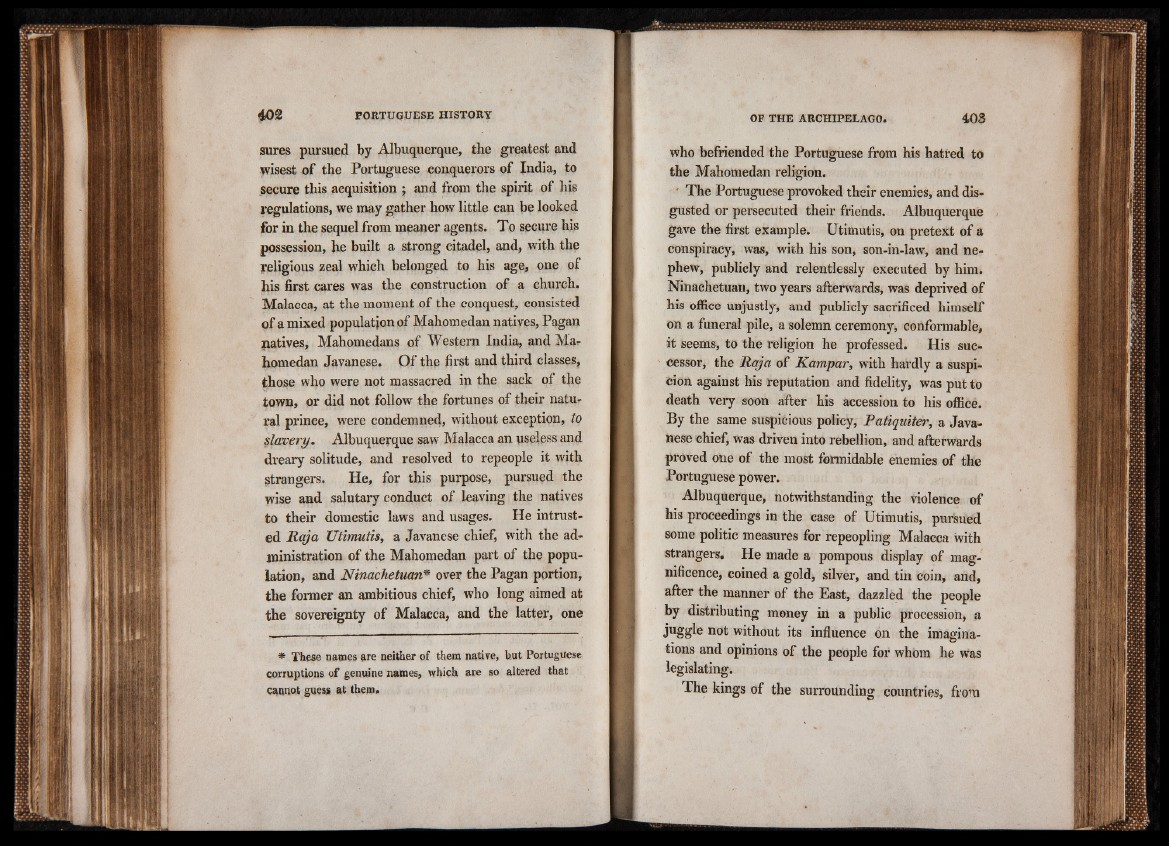
sures pursued by Albuquerque, the greatest and
wisest of the Portuguese conquerors of India, to
secure this acquisition ; and from the spirit of his
regulations, we may gather how little can be looked
for in the sequel from meaner agents. To secure his
possession, he built a strong citadel, and, with the
religious zeal which belonged to his age, one of
his first cares was the construction of a church.
Malacca, at the moment of the conquest, consisted
of a mixed population of Mahomedan natives, Pagan
natives, Mahomedans of Western India, and Mar
homedan Javanese. Of the first and third classes,
those who were not massacred in the sack of the
town, or did not follow the fortunes of their natu-
ral prince, were condemned, without exception, to
slavery. Albuquerque saw Malacca an useless and
dreary solitude, and resolved to repeople it with
strangers. He, for this purpose, pursued the
wise and salutary conduct of leaving the natives
to their domestic laws and usages. He intrusted
Raja Utimutis, a Javanese chief, with the administration
of the Mahomedan part of the population,
and Ninachetuan* over the Pagan portion,
the former an ambitious chief, who long aimed at
the sovereignty of Malacca, and the latter, one
* These names are neither of them native, but Portuguese
corruptions of genuine names, which are so altered that
cannot guess at them.
who befriended the Portuguese from his hatred to
the Mahomedan religion.
' The Portuguese provoked their enemies, and disgusted
or persecuted their friends. Albuquerque
gave the first example. Utimutis, on pretext of a
conspiracy, was, with his son, son-in-law, and nephew,
publicly and relentlessly executed by him.
Ninachetuan, two years afterwards, was deprived of
his office unjustly, and publicly sacrificed himself
on a funeral pile, a solemn ceremony, conformable,
it seems, to the religion he professed. His successor,
the Raja of Kampar, with hardly a suspicion
against his reputation and fidelity, was put to
death very soon after his accession to his office.
By the same suspicious policy, Patiquiter, a Javanese
chief, was driven into rébellion, and afterwards
proved one of the most formidable enemies of the
Portuguese power.
Albuquerque, notwithstanding the violence of
his proceedings in the case of Utimutis, pursued
some politic measures for repeopling Malacca with
strangers. He made a pompous display of magnificence,
coined a gold, silver, and tin coin, and,
after the manner of the East, dazzled the people
by distributing money in a public procession, a
juggle not without its influence on the imagina-
tions and opinions of the people for whom he was
legislating.
The kings of the surrounding countries, from